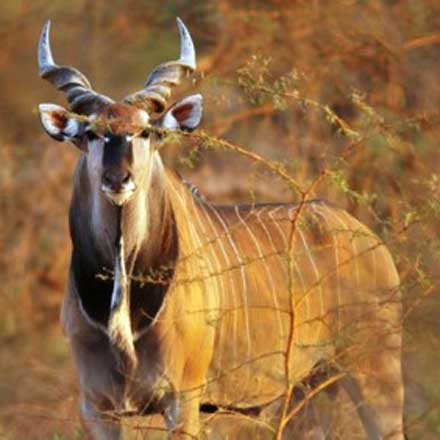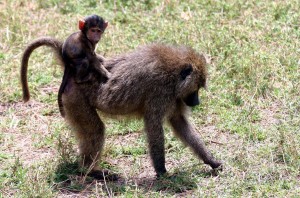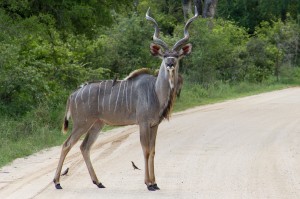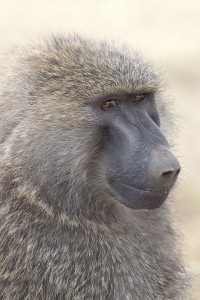
My friend, Stephan, kept inviting me out for many weekends to hunt problem animals that farmers would report when they came to his hunting store in Harare. That was all free hunting, which was great, but before I left Zimbabwe, there were some species I wanted to take for sure. In talking with Stephan, he said he was sure he could get me “local” rates at a smaller hunting camp about 3 hours away. I first needed to know the amounts before I committed, so he said he’d get those for me right away. That’s what buddies are for!
I was shocked when Stephan gave me the amounts. He had explained that I was not here to hunt, but to work for many months. But while I was here, a little hunting would be nice. Local rates are what Zimbabwean hunters pay, and that is what he was able to get for me! I would be charged a daily hunting rate of $100. An eland would run me only $300, a kudu $180, wildebeest only $160, and warthogs and impala, a paltry $40 each! Keep in mind, this was locals' pricing back in 1996, before farms got taken over and the economy there went to heck. For those amounts, I could keep the hide and horns, the PH got to keep the meat which he sold to generate more income.
I was also offered a hippo or crocodile for the whopping price of $800 each- too much, I thought at the time since that was almost triple the cost of an eland. Man! How I wish I had hunted both of those back then!
So I made the drive down Friday after work one week. I arrived around 8 pm at the fairly nice, basic facilities safari camp on a very large farm. Many crops were raised, and the game hunting was just something they offered on the side. Some areas of the farm carried around a dozen species. Cattle were also raised in some portions, and those areas were fenced into very large square sections called paddocks. Basic dirt, two-lane trails ran along the fence lines, between paddocks, used for easy travel. And interestingly, in some of the corners where four paddocks met, there would be a poured-in-place cement water tank with sides about four inches thick, around two feet high, and twelve feet or so in diameter. Opening a few gates, and cattle from the other three paddocks, could all grab a drink at the one water tank. A fairly clever way, I thought, to handle more cattle’s watering needs.
Chapter 1: Elusive Eland
For this trip, which I could hunt all Saturday and most of Sunday, I told my PH that I...
wanted to focus on hunting eland but would consider taking other species if the chance came, and we weren’t hot on the trail of an eland herd. "No problem," he said, but helet me know that he had a prior obligation for the first day and also for Sunday morning.

So he told me his two local native trackers, Mufaru and Tamuka, would be with me for most of my hunting. Oh, and they spoke virtually no English at all. I had no issues with that since they knew what I wanted to hunt, and basic thoughts like “Yes, No, and Shoot” were understood. We sat by the fire and talked until about ten at which time I retired to my thatched grass hut with a comfortable cot inside.
In the morning when I awoke, I grabbed both my .375 and the .223, just in case, and headed out to the campfire area. I also brought my large water canteen. The temperature was going to be in the 90’s, and I wanted to have plenty of water on hand. Mufaru and Tamuka greeted me by the still smoldering fire where one of the offered to carry the light rifle, and the other my large canteen. No words other than “Good morning” were spoken, but I did say, "Thanks" as they grabbed my items to carry. I also said, “eland,” and they both nodded with Mufaru pointing the way for us to walk.
This was going to be nice; the land was flat, so there'd be no hill climbing to deal with. And even if it got too hot later in the afternoon, with frequent breaks to rest and cool off some, I don’t see why I can’t walk all day in search of an eland. I did notice though, that neither of my trackers carried any water or food for themselves- how could they not?
The area we were hunting was not open grasslands, but mostly bush with at times dense brush and smaller trees. I noted that most everything seemed to carry numerous and aggressive thorns. It was such that if I got hung up by one thorn, when I went to pull away, the entire branch seemed to be pulled into me against my shirt or pants. And with hooks on the ends, I couldn’t just walk away and have it pull out, I had to stop and pull it away from myself from the base to the end. It made for very slow going at times.

After about an hour, we picked up the trail of a small herd of eland. It was made yesterday according to the trackers. Following it, we came to the area where they had bedded down for the night and then took off in the morning to feed. Hopefully if we press on, it’s possible we might be able to catch up to the herd later today. We continued tracking for another hour and then two, finally stopping around noon for a lunch break and water.
I was wearing a small fanny pack carrying nuts and trail mix, and I offered some to the trackers, but they refused. I’d started to sweat. Temps were now in the low 90’s, so Itook a good hit on my water. In contrast, Mufaru and Tamuka had brought neither food nor water, and refused both when I offered them some of mine. Then I noticed that neither of them had even broken a sweat while my shirt was dark with it. How are they not hungry, thirsty or sweating???
Into the early afternoon, it is obvious we are getting closer to the herd. My trackers are more intently studying the tracks. We start to see droppings and spots where an animal in the herd has urinated. Tamuka points to a wet spot and says, “Very near.” Up to that point, neither of them had really ever said much. Things are getting exciting, as we push on at an even quicker pace. At around 4 in the afternoon, after over eight hours of walking, the men suddenly come to an abrupt stop, point up ahead and whisper “eland!” The brush is so heavy I can’t see a thing at all. I chamber a round and put the safety on, always mindful of where my muzzle is pointed. In another half hour, we again come to a stop, and again they point and say “eland.” I still don’t see any animals at all.
Suddenly, I hear a mysterious clicking sound which does not at all fit into the scenario. Could a bird possibly be making that sound? Getting their attention, I quietly ask the trackers what the “click-click” sound is, making a soft clicking sound with my tongue. “Eland” they reply, but I’m still so confused. Pressing on for almost another hour, I finally get a brief glimpse of several eland moving slowly up ahead, but no particular animal can be made out, much less...
a large bull, with any certainty.
Mufaru motions to me with his hand to “get down”.
By now though, the sun is getting very low in the sky. Shooting light won’t last much more than another half hour, if that. We press on more, not needing to see our quarry.We’re able to keep near them by the frequent “click-click” sounds that we can now readily hear just up ahead. Another fifteen minutes go by. We adjust our position for the wind, and move in closer. Suddenly, both men stop and squat down near the ground pointing up ahead. “Eland,” one of them whispers, still pointing to our front. We’ve been walking hard for almost nine hours, but from a bent over at the waist position, I can see nothing.
Mufaru motions to me with his hand to “get down.” I squat down like I’m about to make a nature call, sitting on the back of my heels, and look forward to where they both are now pointing. I raise my .375, and peer through the scope. Through a hole in the brush I see a patch of tan about the size of my palm up ahead around 50 yards. This obviously is an eland, but I have no idea what part of him it is, what the animal’s orientation is, nor even if its a shootable bull. Balanced on my toes, my bottom only inches from the ground, I peer and peer, but I still have no idea what part of an eland I’m looking at.
“Eland- Shoot!” they both whisper together. Again I peer and peer, but I only see a patch of tan, slightly bigger than a deck of cards- that’s all I can make out. “Shoot-Shoot!” they urge again. I turn to them and whisper that I have no idea what I am looking at and no way of knowing if it’s a vital spot or not. But my words do no good.Their level of English does not allow them to fully understand me. I again look through my scope. But the herd must have winded us, and they all bolt and go tearing off raising a cloud of dust in the process.
My trackers both stand up and start talking to each other, obviously disturbed, that after a nine hour stalk, I did not shoot. “Eland gone” one of them says, and they both turn and start walking back in the direction of our camp. In the dark, after about two hours with no words being said, we make it back to the camp. How they got us back, in the dark mystifies me greatly!
My PH is sitting by the fire when we all three walk...
up.
My PH is sitting by the fire when we all three walk up. He starts speaking to them in Shona, the native dialect, and they both quickly reply in a somewhat heated tempo. I could tell they were not happy. Finally the PH turns to me and asks what happened?
“After nine hours of tracking, we finally stopped as the herd was within 50 yards of us, in very heavy brush. I had to squat down to even see one, and all I saw was a small patch of tan. I had no idea what part of the animal I was even looking at, much less if it was a vital spot, or even a shootable bull. They kept wanting me to shoot, but I could not in good conscience, fire at only a patch of tan.”
“Ah, I should have told you ahead of time, if they tell you to shoot, it will be a good bull. And whatever part of it you may see, you should shoot, and they will track it if the bull does not go down right away. After nine hours, they wanted you to shoot- they would have tracked it down.”
Inside I thought that I really did not agree with that “shoot and hope” mentality, especially in rapidly fading light. But if I had been told the night before to trust in the trackers and take a shot if they say so, perhaps I would’ve shot for the tan patch. Things were very quiet in camp that night with hopes for better things the next day.
I now know what the click-click sound may be. Some think that when the heavy animals walk, their hooves splay apart as they step down, and when they lift their foot, the two halves snap back together resulting in the clicking we were hearing when very close. It makes a lot of sense to me, and it’s a great way to know when you’re very close to a herd.

Chapter 2: Barking Baboon
As I wake up, I'm still having doubts about what happened at the end of our nine-hour stalk yesterday. In my mind, I still think it was the right thing to not shoot. Mufaru and Tamuka are again waiting at the camp fire Sunday morning, and I’m sure, to them, I’m now known as “The hunter who does not shoot.” I can live with that, but I’m sure they’re not too excited about taking me out today. My PH will not be with me this morning again,...
but at the rates I’m paying, that does not bother me at all.
The three of us take off, again hoping to relocate the same eland herd today. We must have done a lot of crisscrossing and looping back around yesterday, because in only a few hours, we're back again to where we last saw the herd. Just before noon, we came to where they jumped a fence, and went into the next property, so we stop and take a lunch break. Both Mufaru and Tamuka again, do not eat or drink- how do they do that? After just a few minutes, we hear what sounds like a dog barking on and on, perhaps a couple of hundred yards away. My trackers say it’s probably a baboon. A baboon I ask? Boy would I like to get one of those! I motion to them “Let’s go” by waiving my hand, and change rifles with Mufaru, giving him my 375 and grabbing the 223.
Sure enough, in short distance we make out a lone baboon. He is in the very top of a 40 to 50 foot tall tree clinging to a lone, naked branch which stuck out above all theother leafed branches. Both of my trackers have a strong distaste for baboons and urge me to try a shot. He’s up in a tree about 50 feet high and maybe 100 yards away. I chamber a 53 grain Barnes X-Bullet, turn the scope up to 9 power, and while standing, wrap my left little finger around the nearest tree that is barely one inch in diameter.
The large baboon continues barking, a way for him to try and relocate his group, from which he’s been separated. I’m sure Mufaru and Tamuka are not expecting very much at all from me, the hunter who will not shoot. I wait until the baboon is facing me straight on and aim for the center of his chest. I fire and send the Barnes on its way.
At the shot, he launches from the branch like an Acapulco cliff diver. We hear branches breaking all the way down, and it sounds like a fifty-pound bag of potatoes crashed to the ground. All is silent. Suddenly, the trackers start jabbering on and on in Shona- they are giddy! I don’t know what they’re saying, but it’s obvious they are delighted. Finally they calm down just a bit, and keep on saying “Gud shot, Gud shot!”
We all three run to the base of the tree, and find the large male baboon in a heap. The Barnes took in dead center in the sternum and exited the very center of his back- he never knew what hit him! The boys are so very happy, saying again and again, “Gud shot, Gud shot!” In that moment, I know I have...
redeemed myself in their eyes.
Chapter 3: Poacher’s Dog
When hunting in a 3rd world country, it's important to be willing to go with the flow.Hunters have to be willing to hunt how they do, not how they're used to hunting. If the guides say something should be such and such way, then respect it, and do as they say.
Poachers had moved into the area, and the PH was quite upset as a fair number of game was being illegally taken from his land. He warned me about this, and said I needed to keep a lookout for them while we’re out hunting. My trackers were on a high,having seen me snipe that baboon out of the tall tree from around one-hundred yards. They were noticeably happier and friendlier towards me after witnessing that I could and would shoot if I had the chance. I was no longer, “The hunter who does not shoot!” It was early afternoon, and we were on our way back to the camp. Just as we opened a corner gate, and entered the next paddock, we started walking the two-track dirt trai lalong the fence. In just a short distance, we came to a place where a kill had just been made. There was blood on the ground, but of course no animal. The poachers had carried it off. Both Mufaru and Tamuka were enraged, speaking rapidly in Shona, while pointing to sandal tracks, which headed straight down the trail ahead of us. They waved me on, walking fast down the trail, saying over and over, “Poacher, Poacher!” We had barely gone a hundred yards, when Tamuka raised his hand and pointed down the trail, “Poacher’s dog! Shoot!”
At the fence line between the paddock we were in and the next one past it, the gate had been left open. And standing on the top of the stock tank edge is the poacher’s dog,drinking water. It had to be at least 200 yards distant! What do they think I am, a military sniper?
Again and again I hear them say, “Poacher’s dog! Shoot!” “Poacher’s dog!Shoot!”
Up goes my 223, and I take a quick offhand shot at the devil, in their eyes, lapping water from the stock tank. At the crack of the rifle, the poacher’s dog crashes into the water, and all is still. The trackers exploded into a dance of joy, fully ten times what they displayed just an hour ago, when I smacked the baboon out of the tree!
Back at the camp, Mufaru and Tamuka can’t wait to tell the PH about the baboon, and best of all, about dropping...
the dog of the poacher, who’d just made a kill on his land.
“Ken, the next head of game you take is on me! Thanks for getting the poacher’s dog! He has been poaching game on my land for over a month. That will give him second thoughts about coming back here!”
I went from feeling and being viewed as a zero to being the hero in everyone’s eyes within just over an hour. Never get down or become complacent when hunting. Things can change for the better just as fast as they had once turned bad.